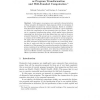Free Online Productivity Tools
i2Speak
i2Symbol
i2OCR
iTex2Img
iWeb2Print
iWeb2Shot
i2Type
iPdf2Split
iPdf2Merge
i2Bopomofo
i2Arabic
i2Style
i2Image
i2PDF
iLatex2Rtf
Sci2ools
134
click to vote
NMELP
1994
1994
Static Semantics as Program Transformation and Well-founded Computation
In this paper, we propose a new constructive characterization of those semantics for disjunctive logic programs which are extensions of the well-founded semantics for normal programs. Based on considerations about how disjunctive information is treated by a given semantics, we divide the computation of that semantics into two phases. The first one is a program transformation phase, which applies axiom schemata expressing how derivations involving disjunctions are made in the given semantic framework. The second one is a constructive phase, based on a variation of the well-founded model construction for normal programs. We apply this two-phases procedural semantics to the computation of the static semantics of disjunctive logic programs as a case-study, showing how it works and what its results are in several examples. A main perspective of this proposal is a procedural semantics for disjunctive programs consisting of an inefficient preprocessing phase (implementing the program transfor...
Related Content
| Added | 10 Aug 2010 |
| Updated | 10 Aug 2010 |
| Type | Conference |
| Year | 1994 |
| Where | NMELP |
| Authors | Stefania Costantini, Gaetano Aurelio Lanzarone |
Comments (0)

